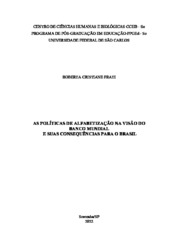As políticas de alfabetização na visão do Banco Mundial e suas consequências para o Brasil.
Resumen
This research entitled "Literacy Policies in the World Bank's view and its consequences for Brazil", aims to understand the political project for education and analyze Strategies of the World Bank (BM) for its scope, with attention to literacy and national education policies in Brazil, seeking to answer the question: in the light of World Bank policies and National Education Policies, what are the guidelines for addressing learning difficulties in literacy? It refers to qualitative research, through bibliographic and documentary research. The research will demonstrate the political elements that make up the publications of the WB that, in turn, present propositions for educational reforms, focusing on literacy and will develop the conception of a globally structured agenda for education, that is, it intends to show how a new form of supranational force affects national educational systems. From there, we will analyze three productions funded by the BM on education and literacy and the National Education Policies to understand their strategies to face the challenge of literacy in Brazil and observe the influence of this mechanism on Brazilian legislation. This dissertation consists of three chapters. Chapter 1, Education and World Agenda, discusses the role that education gains on the world stage assuming a significant role in the process of social transformation, considered as paramount to the preparation of countries to face competition in a globalized economy. It presents the World Bank and its premises for educational reforms in developing countries. In chapter 2, we will address the Brazilian educational guidelines for literacy, bringing a brief historical contextualization of the regulation of teaching in Brazil. It situates literacy in emerging difficulties, presenting the most recent legislations: National Education Plan and National Literacy Policy. For Chapter 3, Technical Advisory, Intellectual Production and Educational Research: The Structuring of the World Bank's Research Work and its consequences for Brazil presents the organizational structure of bm research, for the preparation of specialized publications for developing countries. Also in the third chapter, we will reflect on the legacy that the internationalization of educational policies has left for the third sector. The main conclusions indicate that the educational reforms conceived and implemented by the Brazilian government from the 1990s to the present day were influenced by the diagnoses and guidelines of the World Bank and, deeply, in the example demonstrated by the recent World Bank Literacy Policy Package for developing countries and the National Literacy Policy.
Colecciones
El ítem tiene asociados los siguientes ficheros de licencia:

